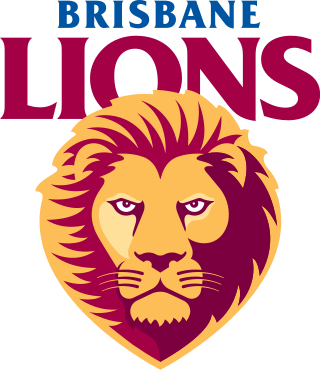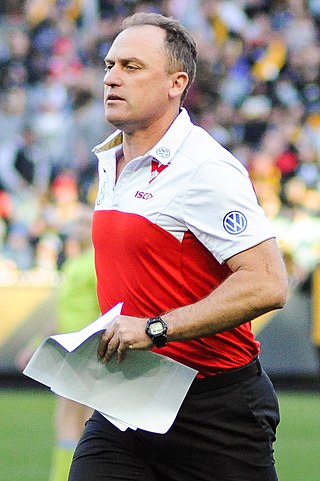Related Research Articles

The Brisbane Lions are a professional Australian rules football club based in Brisbane, Queensland, that compete in the Australian Football League (AFL), the sport's elite competition.

The Essendon Football Club, nicknamed the Bombers, is a professional Australian rules football club. The club plays in the Australian Football League (AFL), the game's premier competition. The club was formed by the McCracken family in their Ascot Vale home "Alisa", and while the exact date is unknown, it is generally accepted to have been in 1872. The club's first recorded game took place on 7 June 1873 against a Carlton seconds team. From 1878 until 1896, the club played in the Victorian Football Association (VFA), then joined seven other clubs in October 1896 to form the breakaway Victorian Football League. Headquartered at the Essendon Recreation Ground, known as Windy Hill, from 1922 to 2013, the club moved to The Hangar in Tullamarine in late 2013 on land owned by the Melbourne Airport corporation. The club shares its home games between Docklands Stadium and the Melbourne Cricket Ground. Zach Merrett is the current club captain.

The Carlton Football Club, nicknamed the Blues, is a professional Australian rules football club that competes in the Australian Football League (AFL), the sport's top professional competition.

The Richmond Football Club, nicknamed the Tigers, is a professional Australian rules football team competing in the Australian Football League (AFL). Founded in 1885 in the Melbourne suburb of Richmond, the club competed in the Victorian Football Association (VFA) from 1885 to 1907, winning two premierships. Richmond then joined the Victorian Football League from the 1908 season and has since won 13 premierships, most recently in 2020.
The Fitzroy Football Club is an Australian rules football club currently competing in the Victorian Amateur Football Association (VAFA). Formed in 1883 to represent the inner-Melbourne municipality of Fitzroy, the club was a member of the Victorian Football Association (VFA), before becoming a foundation member of the breakaway Victorian Football League (VFL/AFL) in 1897.

The Brisbane Bears Football Club was the name for a professional Australian Rules football club based in Brisbane, Queensland.
Craig McRae is a former Australian rules footballer and the current senior coach of the Collingwood Football Club.

Paul Roos is a former Australian rules football coach who coached the Sydney Swans and Melbourne Football Club in the Australian Football League (AFL). As a player, he represented Fitzroy and Sydney during the 1980s and 1990s.

John Longmire is the current coach of the Sydney Swans in the Australian Football League (AFL) since 2010, and is the longest serving active AFL coach. As a player, he represented the North Melbourne Football Club in the Australian Football League (AFL) from 1988 to 1999.

Michael Raymond Malthouse is a former Australian rules footballer, who played for the St Kilda Football Club and Richmond Football Club in the Victorian Football League (VFL).
David Alexander Parkin, OAM is a former Australian rules footballer and coach who played for the Hawthorn Football Club in the Victorian Football League (VFL) and for the Subiaco Football Club in the Western Australian National Football League (WANFL).
John Neville Northey is a former Australian rules football player and coach. He played from 1963 to 1970 with the Richmond Football Club. Northey was a dual premiership player with Richmond, winning flags in 1967 and 1969. He is better known, however, as a coach.
The 1995 AFL season was the 99th season of the Australian Football League (AFL), the highest level senior Australian rules football competition in Australia, which was known as the Victorian Football League until 1989.
The 1987 VFL season was the 91st season of the Victorian Football League (VFL). The season ran from 27 March until 26 September, and comprised a 22-game home-and-away season followed by a finals series featuring the top five clubs.
The 1986 VFL season was the 90th season of the Victorian Football League (VFL), the highest level senior Australian rules football competition in Victoria. The season featured twelve clubs, ran from 29 March until 27 September, and comprised a 22-game home-and-away season followed by a finals series featuring the top five clubs.
The 1983 VFL season was the 87th season of the Victorian Football League (VFL), the highest level senior Australian rules football competition in Victoria.
Wayne Brittain is a former coach of the Carlton Football Club in the Australian Football League (AFL).
The AFL Australian Football League is the top professional Australian rules football league in the world. The league consists of eighteen teams: nine based in the city of Melbourne, one from regional Victoria, and eight based in other Australian states. The reason for this unbalanced geographic distribution lies in the history of the league, which was based solely within Victoria from the time it was established in 1897, until the time the league expanded through the addition of clubs from interstate to the existing teams starting in the 1980s; until this expansion, the league was known as the VFL (Victorian Football League).
The 1972 Carlton Football Club season was the Carlton Football Club's 109th season of competition, and 76th as a member of the Victorian Football League. Carlton fielded teams in the senior, reserves and under-19s grades of the 1972 VFL season.
The 1982 Carlton Football Club season was the Carlton Football Club's 119th season of competition, and 86th as a member of the Victorian Football League. Carlton fielded teams in the senior, reserves and under-19s grades of the 1982 VFL season, and its senior team also contested the 1982 Escort Championships.
References
- ↑ "Former greats find that coaching grates". The Age. Melbourne.
- 1 2 Walls, Robert (14 April 2007). "Biffs, bumps and Bombers". The Age .
- ↑ "Robert Walls" . Retrieved 15 March 2022.
- ↑ "ROBERT WALLS" . Retrieved 15 March 2022.
- ↑ "Robert Walls" . Retrieved 15 March 2022.
- ↑ "ROBERT WALLS" . Retrieved 13 April 2022.
- ↑ "From the foot of the table to the Final Five: Fitzroy's exhilarating 1981 season". 8 July 2020. Retrieved 17 December 2021.
- ↑ "Bill Stephen was Fitzroy through and through". 25 August 2020. Retrieved 12 March 2022.
- ↑ "From the foot of the table to the Final Five: Fitzroy's exhilarating 1981 season". 8 July 2020. Retrieved 17 December 2021.
- 1 2 "Coaches throughout history". 18 September 2013. Retrieved 15 March 2022.
- ↑ "HISTORY LESSON – WALLS COACHING LEGACY BEYOND WINS AND LOSSES". 2 August 2017. Retrieved 15 March 2022.
- ↑ "A coaches story". 10 July 2011. Retrieved 16 March 2022.
- ↑ "So close to the Holy Grail: A personal reflection on Fitzroy Football Club's 1983 season". 26 December 2019. Retrieved 15 March 2022.
- ↑ "Almanac Football History: Fitzroy's Topsy Turvy 1984". 28 December 2020. Retrieved 27 March 2022.
- ↑ "Revising the Doom and Gloom Historiography: Fitzroy Football Club's last golden era 1978-1986". 15 November 2013. Retrieved 13 April 2022.
- ↑ "Robert Walls" . Retrieved 7 December 2021.
- ↑ "Parkin sees both sides". 17 September 2011. Retrieved 7 December 2021.
- ↑ "Robert Walls" . Retrieved 7 December 2021.
- ↑ "Parkin sees both sides". 17 September 2011. Retrieved 7 December 2021.
- ↑ "HISTORY LESSON – WALLS COACHING LEGACY BEYOND WINS AND LOSSES". 2 August 2017. Retrieved 15 March 2022.
- ↑ "Robert Walls" . Retrieved 7 December 2021.
- ↑ "How the infamous Battle of Britain ultimately led to Robert Walls' demise as Carlton coach". 8 August 2019. Retrieved 15 December 2021.
- ↑ Connolly, Rohan (28 May 2015). "Back to the Walls: a familiar tale of turmoil for Carlton". The Age. Archived from the original on 29 May 2015.
- ↑ "SACKED Robert Walls tells JON RALPH and GLENN McFARLANE about the meeting that ended his time at Carlton". 7 August 2019. Retrieved 7 December 2021.
- ↑ "Carlton have a long history of sacking coaches in dramatic circumstances". 26 May 2015. Retrieved 18 December 2021.
- ↑ "The events of '89 repeat at the Blues". 29 May 2015. Retrieved 7 December 2021.
- ↑ "ENCYCLOPEDIA OF AUSTRALIAN FOOTBALL CLUBS" (PDF). Retrieved 16 March 2022.
- ↑ "A coaches story". 10 July 2011. Retrieved 16 March 2022.
- ↑ "Treasured memories of Bear years". 13 July 2012. Retrieved 15 March 2022.
- ↑ "Norm Dare" . Retrieved 15 March 2022.
- ↑ "The World Today Archive - Ugly incident in Australian rules not forgotten". Australian Broadcasting Corporation .
- ↑ "Lateline - 20/4/2001: AFL takes a beating . Australian Broadcasting Corp". Australian Broadcasting Corporation . Archived from the original on 25 November 2004.
- ↑ "Sheedy attacks Walls' credibility". Herald Sun . 11 March 2007.
- ↑ "ENCYCLOPEDIA OF AUSTRALIAN FOOTBALL CLUBS" (PDF). Retrieved 16 March 2022.
- ↑ "ENCYCLOPEDIA OF AUSTRALIAN FOOTBALL CLUBS" (PDF). Retrieved 16 March 2022.
- ↑ "ENCYCLOPEDIA OF AUSTRALIAN FOOTBALL CLUBS" (PDF). Retrieved 16 March 2022.
- ↑ "How the infamous Battle of Britain ultimately led to Robert Walls' demise as Carlton coach". 8 August 2019. Retrieved 15 December 2021.
- ↑ "Whatever happened to Jeff Gieschen?". 6 April 2016. Retrieved 1 November 2021.
- ↑ "A new face after Roos loses faith". Sydney Morning Herald. 3 June 2005. Retrieved 10 April 2020.
- ↑ "Ugly Swans' flag hopes at half-mast". Sydney Morning Herald. 30 May 2005. Retrieved 10 August 2020.
- ↑ Cowley, Michael (13 April 2006). "Roos v Walls: the war of words continues". Sydney Morning Herald . Retrieved 13 September 2019.
- ↑ Waterworth, Ben (1 October 2018). "AFL Grand Final 2018: Robert Walls calls Eagles fans 'gullible' in incredible parting shot". Fox Sports Australia. Retrieved 16 May 2023.
- ↑ "Lightning strike at home of AFL great Robert Walls sparks bushfire in Victoria's north". Fox Sports Australia. Retrieved 24 May 2023.
- ↑ "Hepburn Burras F.N.C." Retrieved 24 May 2023.
- 1 2 Walls, Robert (18 July 2006). "Erin, a football wife extraordinaire". The Age .
- ↑ Coutts, Ian, ed. (2012), Inside Carlton, Carlton North, Victoria: Carlton Football Club, p. 79